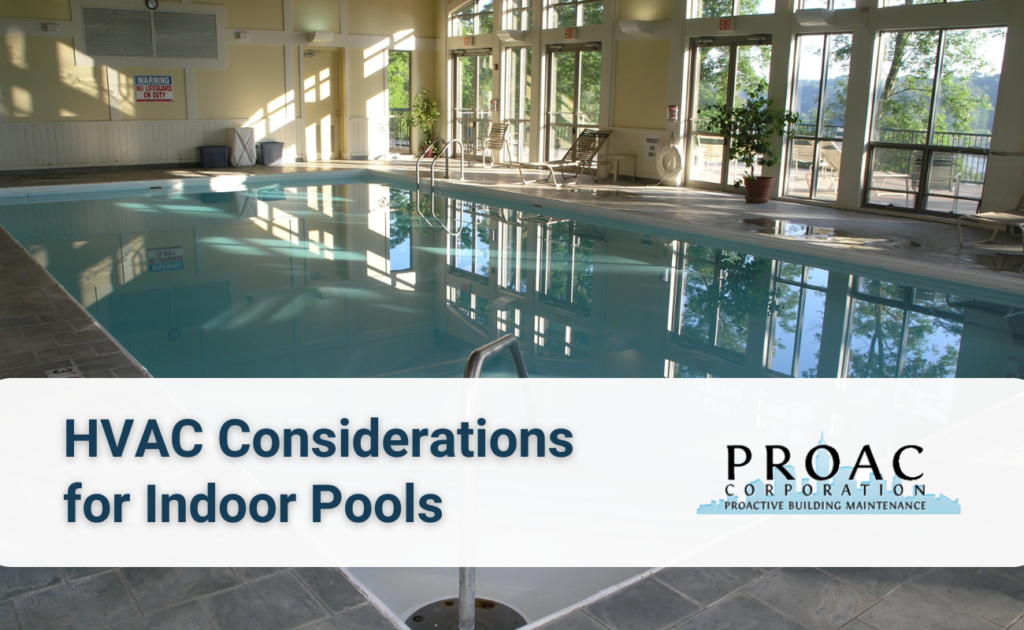Maintaining optimal conditions in natatoriums, especially those found in schools, presents unique challenges for HVAC systems. These systems must handle high levels of humidity, control temperature, impact air quality, and prevent structural damage from the chemically rich atmosphere found in indoor pools. In schools, where natatoriums see high daily usage, HVAC systems must be durable, energy-efficient, and designed specifically for these demanding environments.
At PROAC, we believe in being proactive. Our goal is to help you understand the critical factors involved in managing school natatorium HVAC systems and why proper ventilation and dehumidification are necessary to maintain a safe and comfortable atmosphere.
Assessing Your Indoor Pool’s HVAC Health
There are a variety of ways to inspect your indoor pool’s health. The HVAC needs to be carefully maintained around indoor pools. Performing regular visual checks of the HVAC system, video inspections of the ductwork for mold growth, as well as performing commercial indoor air quality testing for your pool room.
What Are The Optimal Conditions For Indoor Pools?
To maintain a healthy natatorium environment, it’s essential to balance air temperature, water temperature, and humidity levels.
- Temperature: Pool water should be kept between 78-82°F, while the surrounding air should be slightly warmer, around 84-86°F. This slight temperature difference minimizes evaporation, controlling humidity without making the air uncomfortable for those outside the pool.
- Humidity: Humidity in indoor pools should remain between 50-60%. Excessive humidity leads to condensation on walls, windows, and equipment, which can cause mold growth and structural damage over time. For schools where pool facilities are heavily used, controlling humidity helps ensure long-term comfort and reduces the risk of costly repairs.
Special Considerations For Maintaining Natatorium HVAC Systems
HVAC systems for natatoriums require special consideration due to their unique environment. A few key considerations include:
Chlorine Maintenance & Air Quality
Air quality in natatoriums is crucial due to the formation of chloramines—byproducts created when chlorine reacts with organic materials like sweat or body oils. These chloramines can accumulate above the pool surface, leading to eye and skin irritation, and respiratory issues for frequent users, especially student athletes and swim teams. Reducing chloramines in the air requires an effective ventilation system to maintain healthy air quality.
Ventilation & Exhaust Systems
Proper ventilation is the key to removing chloramines. HVAC systems should ensure that the air is continuously drawn away from the pool surface and replaced with fresh air. Strategically placing ventilation and exhaust systems in high-use areas, such as school natatoriums, prevents harmful chloramines from lingering near the water.
Materials To Avoid Using For Indoor Pool HVAC Systems
Because of the presence of chlorine and high levels of humidity, there are some types of materials that should not be used for HVAC systems in natatoriums. Nonresistant metals should be avoided for these types of HVAC systems. HVAC systems in natatoriums are particularly susceptible to damage and corrosion if these materials are used due to the damp, chemically rich air in natatoriums. This corrosion can shorten the lifespan of HVAC components and lead to expensive repairs.
Schools, often operating with limited budgets, should invest in HVAC systems built with corrosion-resistant materials, such as stainless steel or those with specialized coatings, to maximize durability and minimize long-term costs. Regular inspections and preventative maintenance focusing on corrosion control are essential to preserving the efficiency and life of your natatorium’s HVAC system.
School HVAC Maintenance For Indoor Pools
We are no strangers to HVAC maintenance for schools or universities. We have performed mold remediation for schools as well as in-depth air quality testing for schools, which led to many college duct cleanings. When we inspect your school’s HVAC system, ask us about our services that can help maintain your university’s building maintenance.
HVAC Maintenance Considerations For Pool Natatoriums
Given the high usage of school pools throughout the year, regular HVAC maintenance is essential to prevent expensive breakdowns. Inspections should focus on the HVAC system’s ability to control humidity, maintain air quality, and prevent corrosion. This is critical to keeping systems running smoothly during peak usage, such as swim meets or physical education classes.
Contact PROAC Today
At PROAC, our HVAC specialists offer full commercial HVAC maintenance tailored specifically for natatoriums. We help schools avoid costly repairs and extend the lifespan of their HVAC systems by providing preventive maintenance, including regular filter changes, system cleanings, and corrosion control.
Keeping your system in top condition is key to avoiding unplanned shutdowns during critical times. We are located in Bethel, Pennsylvania, and from here, we provide commercial HVAC in Harrisburg, quality duct cleaning in Lancaster, PA, and Berks County Cooling Tower Repair.
Contact PROAC today to learn how we can help keep your indoor pool running efficiently year-round.

